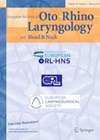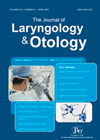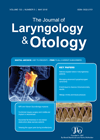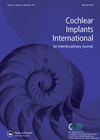
Journal Reviews
Organoids in otolaryngology
This interesting review article summarises the status as well as future prospects of organoid technology in our field. Organoids are a mass of cells which are typically cultured in vitro with 3D technology. They simulate miniature tissues and organs and...
A comparison between trainee and trainer outcomes in mastoid surgery
In this era where training faces restrictions due to theatre time, fewer sessions available to trainees and requirements of consultant-led and consultant-delivered services, one unit confirmed that myringoplasties given to trainees reduced from 34.2% to 16%. This study compares outcomes...
Visual distraction helps patients tolerate flexible laryngoscopy
With the arrival of flexible fibreoptic laryngoscope some 35 years ago, the examination of the laryngopharynx has become remarkably easier and saves immense time and costs since the days of mirror examination when this examination was not truly satisfactory in...
Does trainee participation in cochlear implant surgery affect operative times?
The role of surgical education is a very sensitive issue in spite of the obvious need and the obligation of doctors to pass on their knowledge and experience to the next generation. This study is very interesting as it assesses...
Can junior doctors provide immediate help in airway and other ENT emergencies?
In the present trends for centralisation of ENT emergency services, availability of immediate middle grade or senior help in acute ENT emergencies does not always exist on site and hence the role of junior doctors in handling this is enhanced...
Influence of atmospheric conditions on post tonsillectomy secondary haemorrhage
Haemostasis in epistaxis and a good few other conditions outside the field of otolaryngology seem to be affected by the weather. It is generally thought that dry and hot environment encourages secondary post tonsillectomy haemorrhage. Variations in water vapour pressure,...











